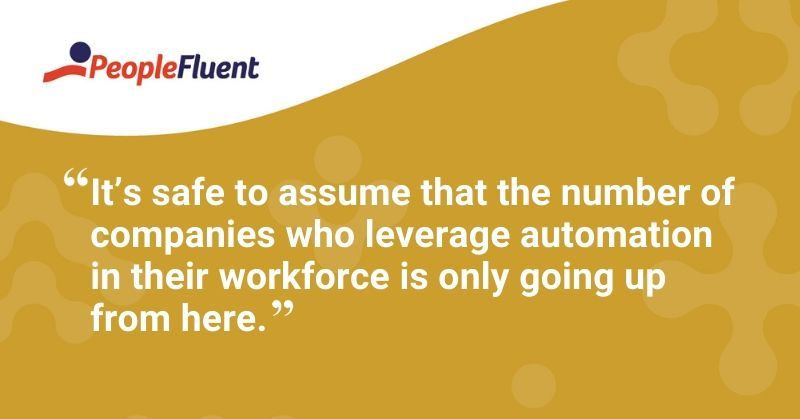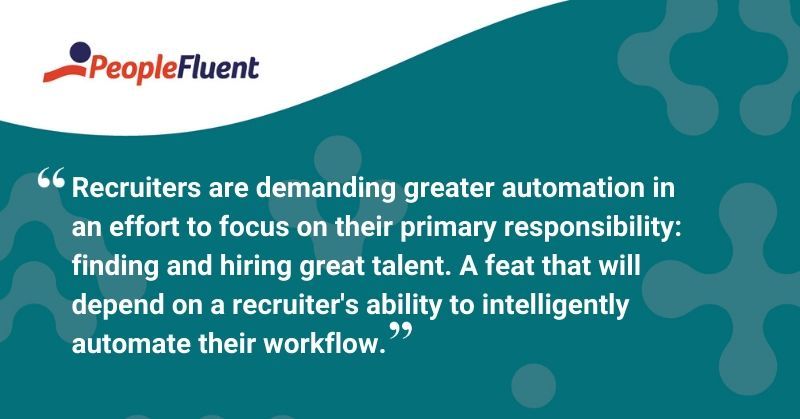Published: Apr 24, 2020Time to read: 4mins Category: Insights
The Power of Automation in Compensation Management and Talent Acquisition
In August 2017, PeopleFluent ran a series of regional networking sessions with our customers called The WISDOM Roadshow of Customer Summits. During the course of the year, PeopleFluent compensation and recruiting experts visited eight cities around the United States to share ideas and inform customers of our products and their functionality. Our experts discovered hot topics, which included best practices for high-volume recruiting, analytics in compensation management, and the effectiveness of video collaboration. Today, we take a look at how these topics have remained common themes among HR professionals and how automation has brought innovation into our workforces throughout the years.
Over the years, we’ve seen a proliferation of automated processes in nearly every industry. For instance, when faced with a skills shortage and the realization of decreased productivity, the multi-trillion dollar construction industry has also turned to automation. When going out for a meal, many of us order food from a screen instead of interacting with a human cashier. In July 2019, Amazon, the world’s largest online retailer decided to utilize drone technology to deliver goods. It’s safe to assume that the number of companies who leverage automation in their workforce is only going up from here.
One of the consistent themes that has resonated across our workforces, regardless of industry, is the need for more automation—especially for compensation management and talent acquisition. Highly manual and administrative tasks continue to be a burden to recruiters and compensation management professionals alike, reducing process efficiency and limiting overall productivity. Below, we’ll dive into a few common themes and examine how they can save your organization time and resources by increasing efficiency and overall productivity in the workforce.

The Preference for Compensation Management Automation
Many compensation management professionals are still reliant on spreadsheets and other manual processes. In their most recent survey of talent management tools, IDC found that over 40% of organizations aren’t utilizing a formal system to manage compensation. Furthermore, the report shows that compensation analysts rely heavily on spreadsheets while compensation managers find automated tools an absolute necessity. Yet, until recently, there have been few compensation management tools available.
There are several key benefits for organizations who make the change from manual compensation management and spreadsheets to an automated tool. These benefits include:
- reducing time, cost and manual errors
- centralizing compensation data in a decentralized environment
- gaining real-time access to centralized compensation data
- minimizing exposure of confidential compensation data that would be otherwise housed on spreadsheets scattered throughout the organization
- immediately reacting to changes that affect compensation, such as organizational structure, compensation plans, performance measures, and data sources
- user-friendliness of managing compensation in one place.
Related content: '4 Dangers of Using Spreadsheet Templates for Compensation Planning'

Automation in Recruitment
On the talent acquisition front, recruiters are demanding greater automation in an effort to focus on their primary responsibility: finding and hiring great talent.
According to Ideal.com, finding top talent will depend on a recruiter’s ability to intelligently automate their workflow. One of the most promising applications of recruitment automation is for resume screening. Based on the same research from Ideal.com, this is due to these three main reasons:
- Manually screening resumes is still the most time-consuming part of recruiting.
- Up to 88% of resumes received for a role are considered unqualified.
- A recruiter spends on average 23 hours screening resumes for a single hire.
In the current candidate-driven market, candidate experience can make or break whether a top candidate accepts your job offer or not. Recruitment automation in the form of chatbots holds the promise for improving the candidate experience, but savvy recruiters should still do the heavy-lifting to provide an exceptional experience. Especially when 63% of candidates report dissatisfaction with the communication they receive from most employers and slow responses are one of the main obstacles that candidates face.
Also read: '4 Practical Ways to Recruit Diverse Talent'
If you would like to learn more about the power of automation as it relates to your compensation management and/or recruiting processes, listen to the on-demand webinar recording of ‘Bridging the Gap: Mid-Enterprise Product Demo’ or contact PeopleFluent sales for more information.
Editor’s Note: This blog was previously published in August 2017 and has been updated with current information.
Ready to automate your compensation management and recruiting processes?
If you would like to learn more about the power of automation as it relates to your compensation management and/or recruiting processes, listen to the on-demand webinar recording of ‘Bridging the Gap: Mid-Enterprise Product Demo’ or contact PeopleFluent for more information.